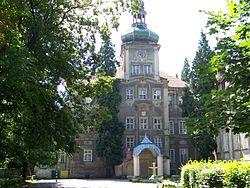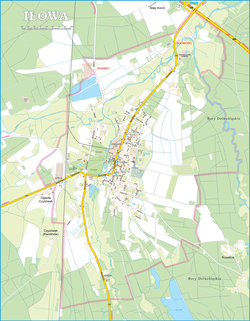Iłowa: Difference between revisions
No edit summary |
No edit summary |
||
| Line 46: | Line 46: | ||
}} |
}} |
||
'''Iłowa''' {{IPAc-pl|i|'|ł|o|w|a}} ({{lang-de|Halbau}}) is a town in [[Żagań County]], in [[Lubusz Voivodeship]], [[Poland]], the administrative seat of the [[Gmina Iłowa]]. |
'''Iłowa''' {{IPAc-pl|i|'|ł|o|w|a}} ({{lang-de|Halbau}}, {{lang-hsb|Jiłwa}}) is a town in [[Żagań County]], in [[Lubusz Voivodeship]], [[Poland]], the administrative seat of the [[Gmina Iłowa]]. |
||
==Geography== |
==Geography== |
||
Revision as of 23:23, 28 December 2016
Iłowa | |
|---|---|
 Palace in the town | |
 | |
| Country | |
| Voivodeship | Lubusz |
| County | Żagań |
| Gmina | Iłowa |
| Established | 10th century |
| City rights | 1679-1830 1962 - |
| Government | |
| • Mayor | Paweł "Bardacha" Cichoń |
| Area | |
• Total | 9.11 km2 (3.52 sq mi) |
| Elevation | 125 m (410 ft) |
| Population (2006) | |
• Total | 3,975 |
| • Density | 440/km2 (1,100/sq mi) |
| Time zone | UTC+1 (CET) |
| • Summer (DST) | UTC+2 (CEST) |
| Postal code | 68-120 |
| Car plates | FZG |
| Website | http://www.ilowa.pl |
Iłowa [iˈwɔva] (Template:Lang-de, Template:Lang-hsb) is a town in Żagań County, in Lubusz Voivodeship, Poland, the administrative seat of the Gmina Iłowa.
Geography
It lies in the easternmost part of the historic Upper Lusatia region, at the border with Lower Silesia. The settlement is located on the Czerna Mała river, a tributary to the Bóbr, in the Silesian-Lusatian Lowlands. It is situated on the rim of the Lower Silesian Wilderness and just south of the future A18 autostrada.
History
The settlement arose in the 10th century, at the crossroad of the trade routes from Görlitz to Żagań and from Guben to Legnica. The medieval chronicler Thietmar of Merseburg (975–1018) mentioned a castle of Ilva, where in 1000 AD the Polish duke Bolesław I Chrobry met with Emperor Otto III on his journey from the canonization of Bishop Adalbert of Prague to the Congress of Gniezno. From the 12th century onwards, the border fortress was controlled by the Piast dukes of Silesia.
Iłowa itself is first documented in a 1356 deed by the Bohemian king and Emperor Charles IV, when he granted the fief of das halbe Dorf an der Czirne (i.e. half the village on the Czerna River, later called Halbau) at the border with the Silesian Duchy of Żagań to the Kottwitz noble family. Mining and smelting of bog iron in the area is documented since the 15th century. The Kottwitz had a castle built here, that nevertheless became a notorious robber baron stronghold and thus was destroyed by armed forces of the Lusatian League at the behest of the Görlitz citizens in 1440. The Kottwitz dynasty sold the estates of Halbau together with neighbouring Kunau to the Upper Lusatian state country of Königsbrück in 1567.
According to an annex to the 1635 Peace of Prague, Iłowa together with Upper Lusatia passed from the Lands of the Bohemian Crown to the Wettin elector John George I of Saxony. Under the rule of his successor Elector John George II, a Protestant church was built and the settlement received town privileges in 1679. From 1682 it was incorporated as a southern exclave into the Lower Lusatian lordship of Sorau held by the Promnitz noble family.
In 1815 Iłowa became part of the Prussian province of Silesia. During World War II a Nazi subcamp of Gross-Rosen was located here from 1944 to 1945. After the war, the area fell to the Republic of Poland and the remaining German population was expelled. Town privileges were restored in 1962.
Notable residents
- Friedrich Boser (1811–1881), artist
International relations
Twin towns — Sister cities
Iłowa is twinned with:


